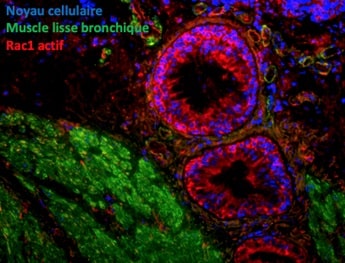NaRacAS Project



Context
Asthma is a frequent chronic inflammatory airway disease affecting 6 to 7% of the French adult population and responsible for nearly 1,000 deaths in France each year. In addition to its inflammatory aspect for which many treatments have been developed, asthma is also characterized by bronchial hyperresonsiveness, defined by excessive bronchoconstriction in response to intrinsic and extrinsic non-harmful stimuli.
The major role of the monomeric G protein Rac1 in the contraction of airway smooth muscle cells (SMCs) was recently shown at the institut du thorax. We observed that the Rac1 protein is expressed in murine bronchial SMCs and that its level of activity is increased in the bronchi of asthmatic mice sensitized to house dust mites. In addition, we demonstrated that nebulization of a Rac1 protein inhibitor in mice not only reduces bronchial hyper-reactivity but also limits allergic bronchopulmonary inflammation. These experimental results suggest that the Rac1 protein could be a new therapeutic target in allergic asthma.
Objectives
We now wish to pursue this study in humans by confirming the involvement of the Rac1 protein in allergic asthma. The main objective of the NaRacAS project is to determine the expression (Rac1) and activity (Rac1-GTP) levels of Rac1 on bronchial biopsies taken during a bronchial fibroscopy (Figure 1). The study population will consist of a total of 3 groups: a 1st group consisting of 21 severe asthma patients, a 2nd group consisting of 21 non-severe asthma patients and a 3rd group consisting of 21 control samples.

Figure 1: Image illustrating the immunofluorescence analysis of Rac1 activity in a human bronchial biopsy
The NaRacAS project will determine whether the activity of Rac1 is increased in bronchial SMCs of patients with asthma and whether this increase is proportional to the severity of the disease. Thus, the development of Rac1 inhibitors would allow the creation of a new therapeutic class that is both bronchodilator and anti-inflammatory, and thus better meet public health needs.
The NaRacAS project is funded by the Genavie Foundation , Nantes University Hospital and the Institut de Recherche en Santé Respiratoire des Pays de la Loire (IRSR-PL).
